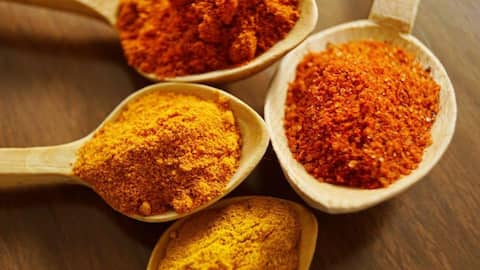Unlocking the healing power of turmeric
What's the story
Curcumin, the active ingredient in turmeric, has gained widespread recognition for its potent anti-inflammatory and antioxidant properties. However, one of the challenges with curcumin is its poor absorption in the body. Fortunately, there are several strategies you can employ to enhance its bioavailability and maximize its therapeutic benefits. Let us look at how to increase the potential of turmeric by boosting curcumin absorption.
Reasons
Limited bioavailability
Before exploring strategies to enhance curcumin absorption, it is crucial to grasp the reasons behind its limited bioavailability. Curcumin faces challenges due to its low water solubility, rapid metabolism in the liver, and inefficient intestinal absorption. Additionally, curcumin's rapid elimination from the human body via bile further contributes to its inability to persist in the bloodstream for an extended duration.
Ways to boost
Pairing with piperine
Piperine, the active compound in black pepper, has been shown to enhance the bioavailability of curcumin by inhibiting its metabolism in the liver and increasing its absorption in the gut. Consuming curcumin alongside piperine can significantly improve its uptake in the body. Adding as little as 1/20 teaspoons of black pepper significantly enhances the bioavailability of turmeric, augmenting its potential benefits.
Healthy fats
Consume with healthy fats
Curcumin is fat-soluble, meaning it is better absorbed in the presence of dietary fats. Healthy fats aid in the dissolution of curcumin in the digestive tract. Therefore, consuming curcumin with a meal containing healthy fats, such as olive oil, coconut oil, or avocado, can enhance its absorption. Additionally, cooking turmeric with oil-based ingredients in dishes can improve its bioavailability.
Role of heat
Heating
Heat enhances curcumin solubility and absorption by breaking down structures in turmeric that trap curcumin, promoting its dissolution in liquid. Cooking turmeric or adding it to warm beverages releases curcumin from its natural matrix, making it more bioavailable. Additionally, heat disperses curcumin particles evenly in the liquid, facilitating better contact with intestinal walls and enhancing absorption.
Quercitin
Fruits and curcumin
Quercetin, a flavonoid found in various fruits and vegetables, has been shown to increase the absorption of curcumin by inhibiting its rapid metabolism. Foods rich in quercetin alongside curcumin supplements or incorporating quercetin-rich foods into your diet may enhance curcumin bioavailability. This synergistic effect arises from quercetin's capacity to impede the metabolic breakdown of curcumin, thus prolonging its presence in the bloodstream.
